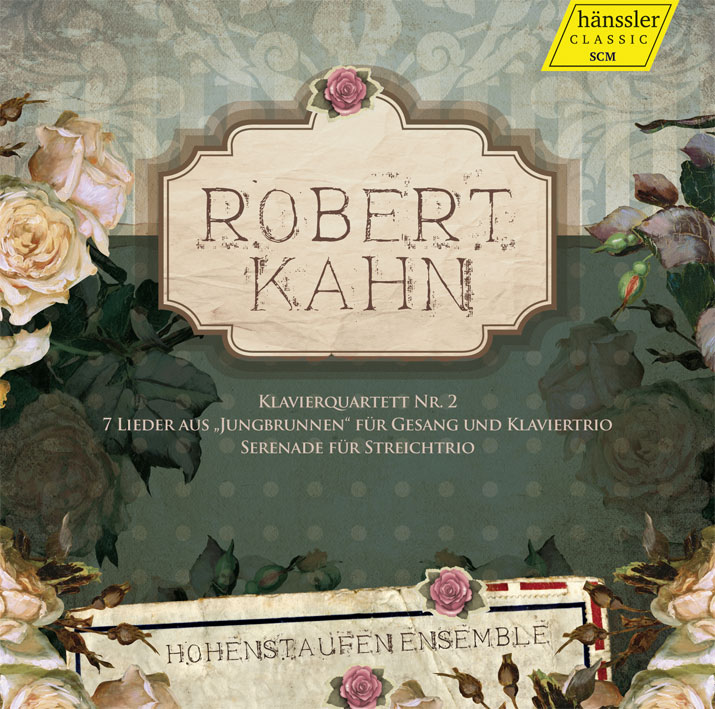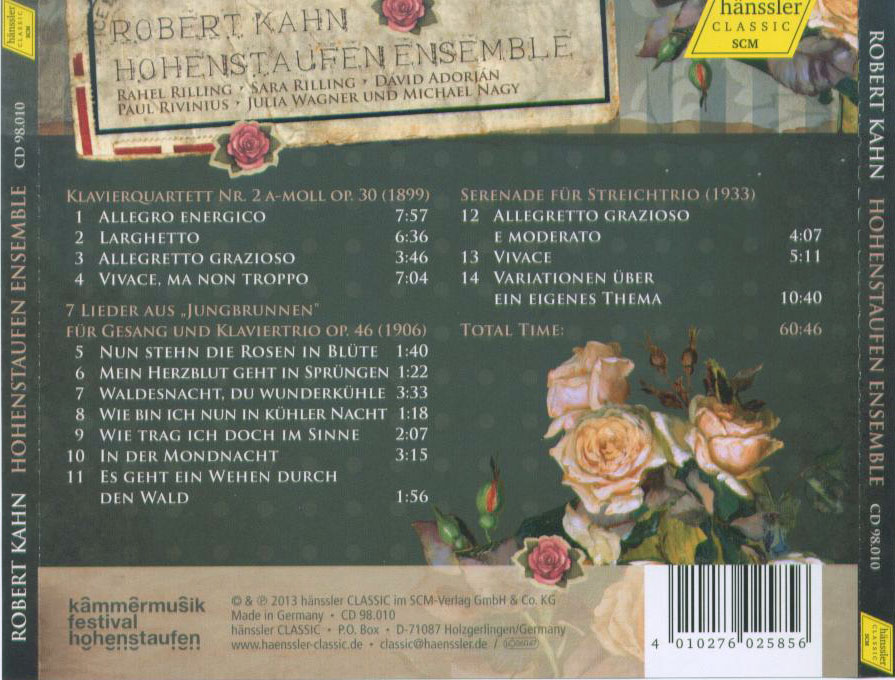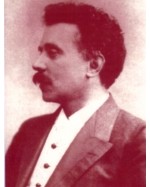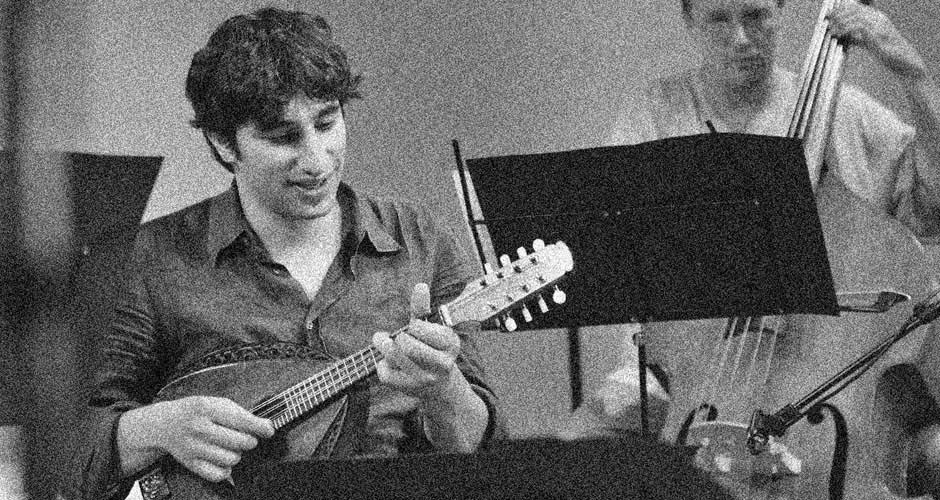Share This
Album at a Glance
Tags
Related Posts
- John Jenkins: The Pleasing Slumber, Aires for a treble, lyra, bass and harpsichord
- Jesús Guridi: Complete String Quartets / Bretón String Quartet
- Sergey Taneyev: String Quartets, Vol. 3 - Quartets nos 5 & 7 / Carpe Diem Quartet
- Wilhelm Peterson-Berger: Violin Sonatas / Ulf Wallin, violin; Love Derwinger, piano
Robert Kahn: Piano Quartet no 2; 7 Songs from “Jungbrunnen”; Serenade for String Trio
Posted by Paul Ballyk on Apr 8, 2013 in Post Romantic | 0 comments
Comparisons of music by German composer Robert Kahn (1865-1951) to that of Johannes Brahms (1833-1897) are unavoidable. Brahms was a traditionalist who sought to retain techniques and structures from the Baroque and Classical periods and apply to them the new freedoms of Romanticism. A generation younger, Kahn's approach can be described the same way; but the similarities run deeper than this. Like Brahms, Kahn's music is marked by an emotional reserve in favor of attention to structure and technique when compared to other late Romantic composers. This is evident in all of the works on this Hänssler Classic CD, especially in the Piano Quartet which begins the program.
This disc consists of chamber music and lieder, two genres which make up the bulk of Robert Kahn's output. There are three works here - the Piano Quartet No. 2, Op. 30 (1899), 7 Lieder aus "Jungbrunnen" for voice and Piano Trio, Op. 46 (1906) and the Serenade for String Trio (1933). The audio sample accompanying this recommendation is from the opening of the first movement of the Piano Quartet, containing some of the more Brahmsian sounding music on the CD.
The set of seven songs here are based upon the whimsical stories of the young poet Paul Heyse, written to entertain children in his charge while he babysat. They are sung alternately by soprano Julia Sophie Wagner and baritone Michael Nagy, accompanied by piano trio. Lyrically written and sensitively performed, it is however unfortunate that translations are not included. If any reader can locate them, (I could not) please leave them as a reply to this post for the benefit of all. The string trio concluding the program is a little more modern sounding, but largely in the same vein as the preceding works.
Incidentally - and this is just a neat little factoid - in 1906, the year Kahn wrote the songs on this CD, his third daughter was born. She would become the grandmother of the two women string players on this recording! No artistic compromise was made to make this so - the performances are first rate.
Johannes Brahms esteemed the composer Robert Kahn (born in 1865 in Mannheim) very much, an admiration that was affirmed when he met Brahms in 1886. Kahn studied under Friedrich Kiel in Berlin and with Josef Rheinberger in Munich and lived as a composer in Berlin. In 1894 he became a lecturer at the Königlichen Hochschule where he remained until his expulsion by the Nazis in 1934. Wilhelm Kempff, Ferdinand Leitner, Nikos Skalkottas, Günter Raphael and Arthur Rubinstein are among his best known pupils. In 1934 Kahn was forced to immigrate to England where he remained to his end of life.
Kahn's Piano Quartet No. 2 was composed in 1899, at the zenith of Kahn's chamber music activity and was often played - not least because of the catchy nature of his themes. The first decade of the 20th century saw the creation of the majority of Kahn's solo songs, totaling about 250. Among them are numerous settings of Paul Heyse, including the series "Seven Songs with Piano Trio by Paul Heyse, 'Fountain of Youth.'" In 1933 Kahn completed his Serenade for String Trio, a highly ambitious work; it seems to want to serve as a kind of retrospective of the 40 years that Kahn worked as a composer in Germany.
This recording comes with a definite sense of authenticity, because Rahel and Sara Rilling (violin and viola) are the great-granddaughters of the composer; together they bring to life this recording of their great forebear's artistically compelling and unjustly forgotten works once again.
Track List
1.1 Piano Quartet No. 2 A Minor op. 30 I. Allegro energico 07:57
1.2 Piano Quartet No. 2 A Minor op. 30 II. Larghetto 06:36
1.3 Piano Quartet No. 2 A Minor op. 30 III. Allegretto grazioso 03:46
1.4 Piano Quartet No. 2 A Minor op. 30 IV. Vivace, ma non troppo 07:04
1.5 Seven Songs from "Jungbrunnen" op. 46 I. Allegretto grazioso 01:40
1.6 Seven Songs from "Jungbrunnen" op. 46 II. Vivace 01:22
1.7 Seven Songs from "Jungbrunnen" op. 46 III. Andante sostenuto 03:33
1.8 Seven Songs from "Jungbrunnen" op. 46 IV. Agitato 01:18
1.9 Seven Songs from "Jungbrunnen" op. 46 V. Allegretto moderato e molto semplice 02:07
1.10 Seven Songs from "Jungbrunnen" op. 46 VI. Larghetto molto dolce 03:15
1.11 Seven Songs from "Jungbrunnen" op. 46 VII. Allegro 01:56
1.12 Serenade for String Trio (1933) I. Allegretto grazioso e moderato 04:07
1.13 Serenade for String Trio (1933) I. Allegretto grazioso e moderato 05:11
1.14 Serenade for Streichtrio (1933) III. Variations on an original Theme 10:40
Source: Hanssler Classic
|
Composer: Robert Kahn Robert Kahn (1865-1951) was born in Mannheim of a well-to-do banking family. He began his studies at the Hochschule für Musik in Berlin. There, he got to know and became friends with Joseph Joachim who was the director. It was through both Joachim and his own family that he had a chance to get to know Brahms, who was so impressed with Kahn that he offered to give him composition lessons. |
|
|
Performers: Hohenstaufen Ensemble In the seven years of its existence, the Hohenstaufen Chamber Music Festival has grown into a successful and highly regarded undertaking. The special atmosphere of the Festival inspired the idea of presenting top-flight chamber music outside the Festival, employing extraordinary, high-profile artists who had already been in Hohenstaufen. Thus arose the “Hohenstaufen Ensemble.” |
| Thinking about purchasing this album?
Follow this link for more album details or to make the purchase. Buy it now |
“Not just recommended. Guaranteed.”
We stand behind every album featured on Expedition Audio. Our objective is to take the monetary risk out of music exploration. If you order this album from HBDirect.com and do not like it you can return it for a refund.









